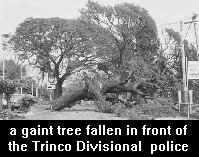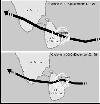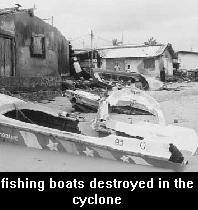The Special Report
31st December 2000
Front Page|
News/Comment|
Plus| Business| Sports|
Mirror Magazine

![]()
Gone with the wind
By Chris Kamalendran and Nilika de Silva
 Tens
of thousands of victims of the cyclone were caught unawares when the raging
Monsoonal winds hit the North Eastern coast of Sri Lanka at an average120
kmph on Boxing Day.
Tens
of thousands of victims of the cyclone were caught unawares when the raging
Monsoonal winds hit the North Eastern coast of Sri Lanka at an average120
kmph on Boxing Day.
Although it was known that this cyclone was on its way more than two and a half days before it hit the North Eastern coast, in the villages, people were unaware of the impending disaster.
The Meteorological Department in Colombo claims that the information was passed down and a day prior to the disaster the media was kept informed, but the information apparently had not filtered down to the people.
The cyclone was said to be the worst after the November 1978 cyclone which hit the country in the Amparai and Batticaloa areas.
Destruction and devastation in the wake of the cyclone which left more than 500,000 homeless, ran into hundreds of millions in losses in the districts of Trincomalee, Ampara and Batticaloa, with further damages in Polonnaruwa, and Mannar as the cyclone and torrential rains left in its trail ravaged paddy fields, tanks spilling over, plantations uprooted and buildings torn apart.
In human cost, it was 10 lives, including that of several small children, and more than 20 fishing boats with fishermen on board missing off the North Western coast of the island.
While officials were still in the process of estimating the actual losses, estimated damages reported amounted to Rs. 5 billion for Telecom in Trincomalee alone with 7,500 telephones broken, and CEB sources said the losses exceeded 100 million, with large numbers of transformers broken.
Within 24 hours of the disaster the government announced that Rs. 12,000 would be given to the families of those who died in the cyclone. But immediate relief to refugees was almost invisible.
"we have not got any assitance so far'' D.M. Magilin, 64 who had taken shelter in a temple in Trincomalee told The Sunday Times, a day after the cyclone hit them.
Relief assistance was not reaching them at the same speed which they were being announced after top level conferences.
While private sector companies lead by Maliban Biscuits donated Rs. three million worth of biscuits to feed the hungry children in the cyclone hit areas, the state sector was still putting its massive machinery to work. The paper work alone was extensive and it would be several days before the fruits of their labour reached the people.
Sixty thousand people in the East were rendered homeless and more than 30,000 acres of paddy was destroyed. In Trincomalee alone more than 10,000 families were affected, most of them fishing families.
 More
than 20 little boats with outboard motors of horse power 15, were washed
away to the sea. Each of these boats cost about Rs. 75,000, and the loss
would take years to recover, a fisherman said.
More
than 20 little boats with outboard motors of horse power 15, were washed
away to the sea. Each of these boats cost about Rs. 75,000, and the loss
would take years to recover, a fisherman said.
Further down the coastline the damage was worse as the cyclone had more momentum when it smashed inland. In Pulmoddai a fishing village was razed to the ground. Some fishermen were also reported missing with their boats and whereabouts still unknown.
On the beach running parallel to Trinco town the fishermen had gathered the morning after the cyclone to weigh their losses.
Even in the face of a giant cyclone, fisherman R.P Dhanapala lamented, "Hunger is the biggest problem we face."
Just a few hours after the cyclone had moved out, four fisher boats had put out to sea. Driven by hunger, these men could not afford the luxury of fear as their women and children starved in refugee centers.
"At a time like this we need the support of the Government," Nishantha Sanath, a tradesman at the fish market said.
"But the Minister of Fisheries earns his votes in the South, so he doesn't think it worth coming this way to see our plight. He has forgotten that he is the Fisheries Minister for the whole of Sri Lanka," he said.
In the Batticaloa district more than 50,000 displaced people were gradually picking up their lives but with at least 4,000 houses extensively damaged they were finding it difficult to return to their homes. It was only last month that Batticaloa suffered extensive losses when torrential rains and resulting floods destroyed the paddy lands leaving many farmers helpless.
In the aftermath of the floods and cyclone there was also the imminent threat of health problems developing.
Batticaloa's Government Agent R. Monagurusamy said in schools where there were many displaced people, there was a problem of sanitation facilities as the toilets were insufficient.
He said one of the immediate problems faced was that detailed reports about the damages were not yet available. He also said they could not release funds immediately to start re-building the houses. He also said there would be problems of accommodation in schools when they begin the new term next week.
In Polonnaruwa the bursting of tank bunds saw acres of fields going underwater and more than 12,000 houses, including wattle and daub houses being damaged.
Polonnaruwa District Secretary, S.A.P. Makehelwala said one of the main problems they would be facing was to find temporary shelter for the families. He said the worst affected were the farmers.
He said five people were killed as they were drenched in the rain and did not have the facilities to get to hospital. Four of the victims were from Hingurakgoda and one from the Lankapura village.
He said they had not been able to get full details of the damages as certain areas were yet not accessable while the immediate concentration had been on the relief work.
Acres and acres of paddy fields were destroyed in the ravaging winds which uprooted massive trees and tossed coconut trees.Vegetable cultivations were also severely damaged.
Wickramasingha a banana cultivator in Habarana was busy among the trees which provided his family their livelihood. "These trees produce about Rs. 5,000 worth of harvest each month, but the cyclone took it all," he lamented.
Refugees at the Sri Sumedhalankara Vidyalaya, Chinabay thronged around us as we stopped to see how they were doing. More than 500 families with more than a thousand children were without food or a drop of water the whole day. Not even a bowser of water had been provided for the families.
Sixty-year-old M.A. Podi Hamine from Andankulama was one among the hundreds who thronged around us hoping at least we would provide some relief. It was a pitiful sight. The unfairness of it all struck home in their cry, "apatamai koti gahanne, apatamai sulisulang hamanne, api gena balanna katavath uvamanavak ne" (It is we who are attacked by the tigers, it is we who are hit by cyclones, and no one is concerned about our welfare.)
"The Government of Colombo has hardly the time or inclination to see whether we are dead or alive," a tradesman G. Aruna said.
Will it come again?
A cyclone similar to what hit Sri Lanka early this week may recur in three weeks time, Meteorological Department warned.
Deputy Director of Meteorological S.R.Abeysinghe told The Sunday Times that a cyclonic situation was currently developing in the pacific ocean and could head towards Sri Lanka.
'The cyclone could be very similar to what struck Sri Lanka', he said.
The cyclone that hit Sri Lanka on Tuesday left the country, and entered South India and headed with increased momentum towards the Middle East by the end of the week.
Relief is on the way Interview with Social Services Minister Milroy Fernando
Q. What relief has been granted to the cyclone victims ?
A. We have issued instructions to the District Secretaries and GAs to provide sufficient dry rations for two weeks through the co-operatives. In Trincomalee it is difficult to buy bread that is why we decided to issue dry rations rather than cooked food. We have also called for details regarding the extent of damages, and the Grama Sevakas and Government Agents will furnish us with the necessary statistics in this regard.
Q: We were in Trincomalee and the people appeared to be unhappy.
A: In the Trincomalee District, including the uncleared areas of Muttur there are 83,000 families. We have decided to issue dry rations to all these families for a period of two weeks. The Red Cross will transport the rations to the uncleared areas.
Q: Why then are the people dissatisfied with the service ?
The people are protesting that we have not sent them bowsers of water. But this is not an easy task, because first the water must be purified before it is taken and it has to be transported from Kantale. Even when I visited Trincomalee there were some villagers blocking the roads not allowing the lorries to pass. They were protesting that bowsers of water have not been sent to them. And at Chinabay there were people sleeping across the bridge in protest
. Q: Since the state was aware that the cyclone was going to hit these areas why were steps not taken to have the goods ready for delivery when the event occurred ?
A: The people were kept informed of the developing situation through the radio and television. But it appears they did not take necessary precautions. Since it was the festive season, the people appeared to be more keen on celebrating than safeguarding their possessions. Even in my area many trawlers and 'vallama' were destroyed. The people could have easily saved these if they had acted fast.
Tears and terror
 Trincomalee
district was a dismal picture, cloaked in darkness the morning after the
cyclone. As grey clouds loomed in the sky as if threatening another night
of terror, the still air carried with it the foreboding which both heralds
and bids adieu to natural disaster.
Trincomalee
district was a dismal picture, cloaked in darkness the morning after the
cyclone. As grey clouds loomed in the sky as if threatening another night
of terror, the still air carried with it the foreboding which both heralds
and bids adieu to natural disaster.
The beach front was a shamble with broken boats and ravaged buildings which had faced the onslaught of waves that had reached 20 to 30 feet high the night before. The sea had flowed almost 20 metres inland slamming into the line of fishing huts which crumbled beneath the pressure.
The cyclone threw up a buried haul of 4,000 bullets buried more than a decade ago on the Trinco beach. Police have carefully sealed these bullets in polythene for later use.
The road to Trinco was a hive of activity. Just hours after the cyclone moved on, villagers were cutting down and removing tree trunks, re-fixing cadjan roofs and tying down the asbestos sheets.
Massive trees lay fallen across the road to Trincomalee making it impassable, and more than 20 lorries were at a stand still as villagers grew busy with saws to chop the trees and clear the road to allow traffic to inch past the obstructions. Several lorries had gone off the road attempting to circumvent the fallen trees.
Telephone wires had come down as trees had fallen on lamp posts which resembled bent candles. Electricity had been turned off to prevent accidents and further damages.
A young woman homeguard was severely injured when a tree crashed through the bunker roof at Thamunugama. It took 2 1/2 hours to clear the road to take her to the Kantale Hospital from where she was transferred to the Anuradhapura Hospital.
That morning a mass demonstration took place at the junction in 'hatare kanuwa' near Chinabay condemning the fact that no Government representative had come to help out in the peoples hour of need. "The G.S. never came, even the MP has gone to Gampaha. Not even a bowser of water was provided for us," the people charged angrily. It was the Police who convinced the people that things would be taken care of.
At the Sri Sumedhalankara Vidyalaya, near 'hatare kanuwa' thousands of refugees had gathered. "There is so much destruction around us but where are the representatives of the people Raja Sarath said.
With tears streaming down her face one woman sobbed, "If this had happened in America, by now our government would have released a message of condolence".
"My husband is away fighting in the North, and I was alone to face the terror of this cyclone. The Government should be more concerned about our welfare," R.N. Dharmawickrema said.
"Deiyo thamai danne apata monavada une kiyala," (Only God knows what has happened to us) W. Mary of haye kanuwa said. This little bundle of joy in its mother's lap looks at passersby quite unconcerned by the rigours of living. The mother is trying to eke out a living by selling sweep tickets. pic by Ranjith perera







![]()
Front Page| News/Comment| Editorial/Opinion| Plus| Business| Sports| Mirror Magazine
Please send your comments and suggestions on this web site to

